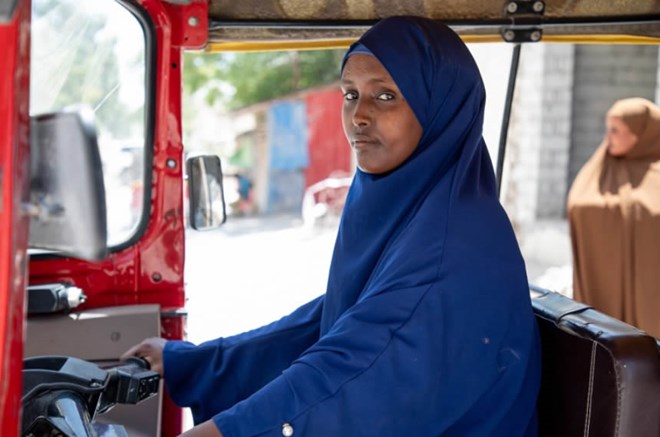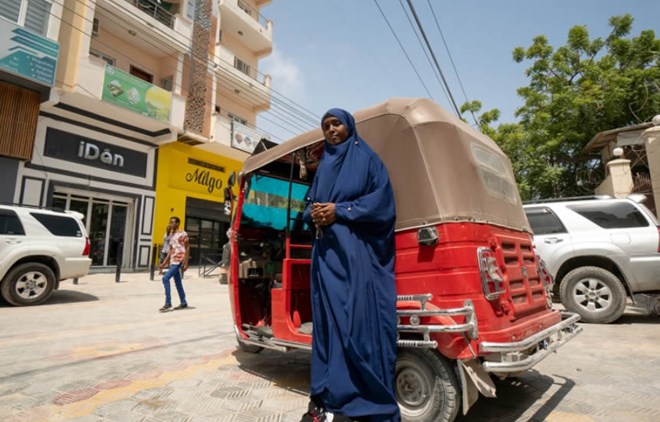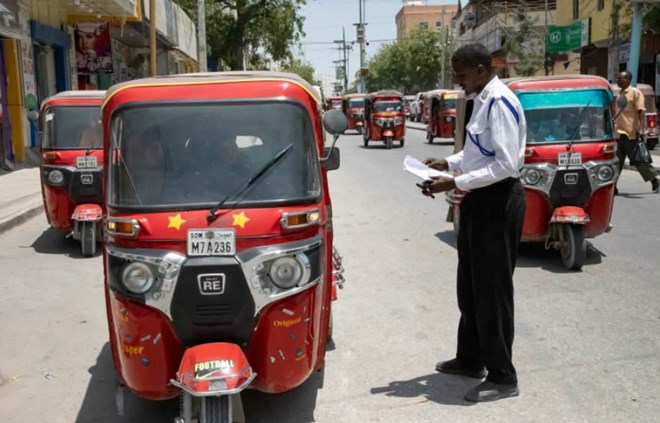
Sunday March 7, 2021
By Hamza Mohamed
Saynab Abdikarin has ventured into an industry that was exclusively male-dominated in conservative Somalia.

Saynab has been driving tricycles on the streets of Mogadishu for 11 months [Noor Mohamed/Al Jazeera]
Saynab Abdikarin turns heads everywhere she goes in Mogadishu. The 28-year-old is the first woman to drive a rickshaw taxi in the streets of Somalia’s conservative capital, where the tricycles commonly known as “bajaaj” have long been operated just by men.
“I believe that whatever job men can do, women can do, too,” says Saynab.
A mother of five, Saynab took on the job out of necessity 10 months ago after her husband left her and their children.
“I don’t have anyone to support me,” she says. “If one of my children is not feeling well, I have no one to help me. I work to support my children.”
But driving a rickshaw in Mogadishu “has a lot of challenges”, Saynab acknowledges. Besides the occasional social disapproval – “some of the men support you, but others say women should be at home and not working”, she says – Saynab is also exposed to the many dangers associated with the job.
In April 2019, three people died when security forces opened fire during a protest that saw hundreds of drivers take to the streets of the city over the killing of a rickshaw operator by a security officer.
Rickshaw drivers have also been caught up in attacks by the al-Shabab armed group, whose fighters frequently target security checkpoints in Mogadishu.
On February 13, at least seven tricycle drivers were wounded at a checkpoint during a suicide bombing.

Saynab says she prefers to work in Mogadishu’s centre [Noor Mohamed/Al Jazeera]
In response to attacks or as a preventive measure, the government has shut down several roads in Mogadishu – a move that is hurting Saynab and her colleagues financially.
“When roads are closed, it is a problem,” Saynab says, calling on authorities to reverse the policy.
Meanwhile, the city’s female residents, who for long wished there were female rickshaw drivers they could call on, have welcomed Saynab.
“I choose her because she is a woman; I choose her because I want to encourage her,” says Safiya Ali, who has been taking Saynab’s tricycle to work and back for the past six months.
A shop owner in Mogadishu’s Hodan district, Safiya says she has never been happier in a taxi.
“I would like other women to also take her taxi and encourage her even more,” she told Al Jazeera.
But Safiya says she worries “a lot” for Saynab’s safety, especially when she works after sunset.
“Mogadishu’s security can be bad,” she says.
Welcomed by other drivers
Insecurity is a major concern for all rickshaw drivers in Mogadishu, and like her male colleagues, Saynab says there are certain neighbourhoods she avoids going to, particularly at night.
“You can get robbed or get killed,” she says, listing Kaaraan, Shiirkoole and Dayniile as some of the areas she will not drive to. “I prefer to work in the downtown area.”
Police officers often give rickshaw drivers a hard time at the many checkpoints dotting the seaside city, but Saynab says being a woman has worked to her advantage when it comes to dealing with security officers.

Police officers often let her go through security checkpoints because she is a woman, according to Saynab [Noor Mohamed/Al Jazeera]
“Because I’m a woman, most soldiers do not stop me. They don’t bother me. They understand I’m a mother working to support my family. They treat me with respect,” she says with a smile.
Male drivers have also welcomed her and say they are happy a woman has finally joined their industry.
“It is really good seeing a lady working as a rickshaw driver,” says Noor Aden Isse, a colleague of Saynab, urging more women to follow her example.
“I would like to tell all girls to work and not depend on anyone,” he told Al Jazeera. “I also want to tell all the young men that there is work, that they can find work like Saynab.”
Somalia has one of the youngest populations in Africa, with more than 70 percent under the age of 30. But three out of four young Somalis are without formal employment, according to the World Bank, as conflict and insecurity drag on.
More than 60 percent of the country’s youth plan to leave to look for better livelihood opportunities abroad, according to the United Nations.
But Saynab says young people should not abandon Somalia.
“There are jobs in our country if someone wants to work,” she says. “I want to tell the ladies, especially those divorced, you can drive a rickshaw and provide for your family. It is better than to ask for a handout from someone else.”